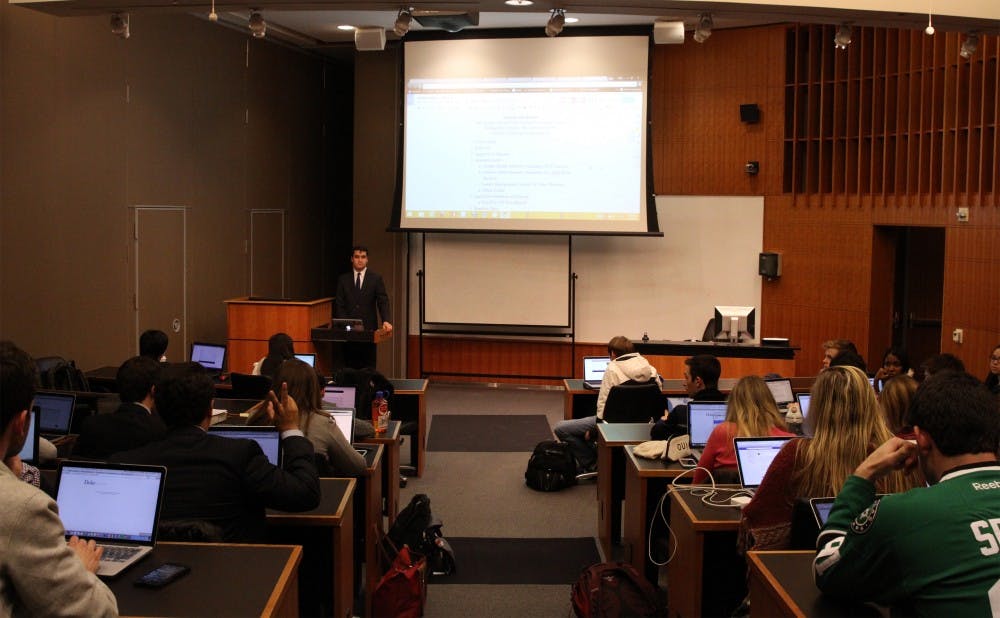Duke Student Government Senate voted Wednesday on which pass/fail policy to propose to the "Imagining the Duke Curriculum" committee.
Vice President of Academic Affairs Tara Bansal, a junior—who works closely with committee chair Suzanne Shanahan, associate director of the Kenan Institute of Ethics—requested the Senate’s input on how to amend the pass/fail policy. The IDC committee is considering changing this policy as a part of the ongoing curriculum review process to allow students to explore their academic options without fear of receiving undesirable grades. DSG Senate was asked how incoming Trinity students should be able to apply pass/fail to their classes, Bansal explained.
"Overall, the curriculum committee is in support for an expansion of pass/fail across the board, meaning that pass/fail would count for your curriculum expectations and hopefully, for some of your major requirements as well,” Bansal said. “Specifically, in terms of what's going to be mandatory versus optional, there are no decisions being made yet. A big part of the decision-making process is going to be what students are advocating for and what students want.”
VIDEO: DSG Senate Meeting Feb. 10, 2016
The current policy allows students to take up to four pass/fail classes—technically called satisfactory or unsatisfactory—which cannot be used in GPA calculation or for degree, major, minor, or certificate requirements.
Bansal cited the successful use of mandatory pass/fail policies at schools like Johns Hopkins University, the Massachusetts Institute of Technology, Swarthmore University and Brown University.
Freshman Josh Curtis, senator for academic affairs, expressed concern about students misusing the pass/fail classes to inflate their GPAs. Bansal responded to this concern by saying that although there will be a few students who may take advantage of the system, the majority of students will benefit from the opportunity of academic exploration.
All proposed pass/fail classes are in the freshman year. The options DSG voted on are as follows: four pass/fail classes in the Fall; two pass/fail classes in the Fall; two pass/fail classes in the Fall and two in the Spring; two pass/fail classes in the Fall and one in the Spring; or none at all.
The results of the poll have not been made public, but will be discussed with faculty and will help shape the curriculum review process.
In addition to the pass/fail policy, DSG also discussed recommendations on how to fix problems students face when using ACES. Their recommendations included showing a mailbox number, being able to open multiple tabs, receiving confirmation when a transcript has been sent, improving the mobile site and having the ability to use a back button.
In other business:
DSG was asked to complete a Senate demographics survey, which will show how DSG represents different demographics on campus. The results of survey will be presented at next week’s meeting.
Senior Brian Hopkins, senator for academic affairs, announced that he will be forming an informal surplus committee to examine ways in which DSG can spend the surplus.
Junior Ilana Weisman, vice president of equity and outreach, presented bylaw revisions to exclusively now use gender neutral pronouns. DSG Senate will vote to approve these revisions next week.
Finally, DSG unanimously approved the formation of two new clubs: the Equilibria Economics Review and Duke Students for Animal Rights.
Get The Chronicle straight to your inbox
Sign up for our weekly newsletter. Cancel at any time.
Class of 2019
Editor-in-chief 2017-18,
Local and national news department head 2016-17
Born in Hyderabad, India, Likhitha Butchireddygari moved to Baltimore at a young age. She is pursuing a Program II major entitled "Digital Democracy and Data" about the future of the American democracy.

